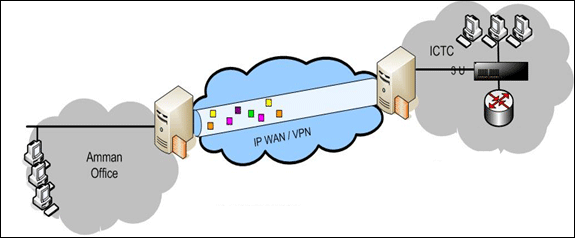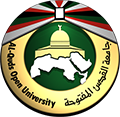The Systems Engineering and Infrastructure Department (SEID) is responsible for establishing a network infrastructure for al-Quds Open University’s (QOU) locations to ensure continuous, reliable, secure, and efficient services performance with minimum cost, depending on the Department’s highly qualified engineers and technicians. The Department seeks to achieve the philosophy of the University represented in e-learning and open education and provide advanced technology to facilitate the enrolment in the University’s programs. Moreover, the Department is the nerve system of the University and the safety valve for the use of computers in all the University sectors. It also follow-up the development and upgrade of all computerized network technology and systems.
Objectives:
The department mainly aims at designing plans to ensure an integrated technological environment in the University’s operating systems and networks, as follows:
- To provide and equip solid technology infrastructure to operate and manage the University’s main database center and publish the electronic services on the internet efficiently and effectively.
- To provide a high quality of technical support services for the technology infrastructure at the University’s branches, centers, and departments.
- To ensure high-speed Internet lines and provide alternative sources of electric power, to ensure the continuous work of servers and hardware in the University and branches.
- To manage the database center, including the main servers and operating systems, which serve the University’s branches and departments, in addition to providing the necessities to maintain their stability and sustainability.
Tasks and duties:
- Planning and developing the University’s technological infrastructure.
- Providing the employees and students with Internet service.
- Following up and developing wireless network at the University.
- Monitoring the University network’s functioning and dealing with any occurring problem.
- Enhancing and updating the operating systems appropriate to the applications used.
- Updating the main servers in accordance with the electronic services requirements.
- Updating and following up on the central backup units to meet the work needs.
- Keeping backup copies of different file types from all the servers and storing them safely.
- Applying the safety policies and monitoring any misuse.
- Managing the staff’s accounts on the University network.
- Managing the staff’s emails accounts.
- Providing security systems and integrated electrical sources for the central backup units and the University’s branches and departments.
- Providing technical support of information technology and communication for the University’s branches and departments.
- Preparing technical specifications of the University’s needs of technological infrastructures and following up official tenders with relevant parties at the University.
- Supervising the implementation of tenders, following up with the suppliers, and carrying out technical checks to ensure compliance with the required technical specifications.
- Following up maintenance contracts with the suppliers.
- Providing and Monitoring the required communication lines to ensure the functioning of the University’s electronic and internet services, whereas the University is provided with two main internet lines. In addition to connecting the University’s branches and centers with the ICTC through a wide area network (WAN).
- Providing a video conference system for internal meetings -between the University branches- as well as external meetings.
- Supervising the establishment and updating of the computer labs at the University including labs for computer applications, Internet labs, labs for the visually impaired, telecommunication labs, and multifunction labs.
- Providing the resources and equipment necessary for the enhancement of electronic services, especially during COVID-19, to ensure an adequate educational environment for the teaching staff and students.
Achievements:
- Virtual Private Servers System
This system is important for the University servers to maximize the resources available on physical servers such as Storage, CPU, and Memory. Physical servers are converted into virtual ones, and many new high-speed servers are established. The system features easy central control to facilitate management and access to servers, a process to connect to cloud computing and install servers of maximum speed within a short period.

- Servers and Networks Monitoring Systems
This system is responsible for monitoring the communication lines between the University branches, quick identification of failures and problems, data capacity moving through these lines, in addition to ensuring the branches’ access to electronic services through the University network. Moreover, this system monitors the resources available on the servers through monitors for this purpose and access to necessary reports requiring direct intervention by system engineers during emergencies.
- Backup System
This system is responsible for making backup copies of the University-specific data, including financial databases and student and staff data, to be recovered in case of systems failure or natural disaster.
- Data Storage Units System
This system is responsible for collecting the services and databases on storage units with high specifications. It has all the requirements to maintain services on an ongoing basis and fast functioning, making it easier to control and manage these services. This system also provides services protection on the Hardware or Software Failure level with the possibility of secondary storage units outside the center.
- Firewall Systems
This system is responsible for protecting the University’s data and information. A key protection system is activated at the ICTC to protect and access the University services as required. Moreover, the firewall systems are installed in the University branches in the West Bank, and the Virtual Private Network (VPNs) are activated between the branches and the ICTC.
- Load- Balancer System
This system is responsible for providing a highly-available technology infrastructure of Web Server System used in the academic portal to reduce pressure and load resulting from the increase of users numbers. Moreover, it is distributed fairly and comfortably to servers that work in this system instead of relying on certain servers and not being able to meet the demands of the users. Therefore, two units of load distributors are operated in cooperation with the Department of Software Engineering that work in parallel and replace each other in case of failure.
- Email System
This system is responsible for providing a modern and updated email system able to cope with the techniques of the accelerating world of technology. It is also responsible for official electronic communications (emails) within and outside the University, using web technologies and smartphones for fast performance, friendly usage, and security. Moreover, the University provides this service through cloud computing (Office 365) to educational institutions free of charge and with high storage capacity.
- Staff Accounts Management System
This system allows the IT Department to manage the users, applications, data, and other areas of the Institution’s networking. Moreover, the Active Directory is vital to protect the database user’s credentials, systems, sensitive data, programs’ applications, and unauthorized access. This system also allows controlling password policies in nature and complexity, sharing files and general user privileges and permissions.
- Tier-IV Data Center Power Infrastructure System
This system is responsible for providing the servers room and al-Quds Educational Channel with an integrated electric protection system (Tier-IV data center power infrastructure). The main purpose is to protect the servers’ room from any change in power supply, loads from power cuts, or malfunction of any element of the system through the integration of the following systems:
- Generators: work through a special control board to switch between generators and keep the power sustainable.
- UPS system: keeps feeding and protecting loads in case of disruption or change in the power supply.
- STS system: switches between central UPS devices within seconds in case of any failure or emergency.
- Wireless Network Project
This project aims to cope with the accelerating technological development and spread of smartphones. This is done by creating an auxiliary Wi-Fi to the current Wi-Fi network in the University branches to reduce the pressure on labs during the e-registration periods and provide Wi-Fi service for the smartphones of teaching staff and students.
- Video Conference
This project aims to provide a Video Conference system for internal meetings, conferences, and workshops.

- Development of Computer Labs at the University
Computer labs are one of the technological services provided by the University to students. The University provides 127 labs with 2416 computers used by students for several purposes:
- Electronic services such as log-ins and surfing webs.
- Training on software applications for courses with practical parts.
- Electronic submission of level examinations.


